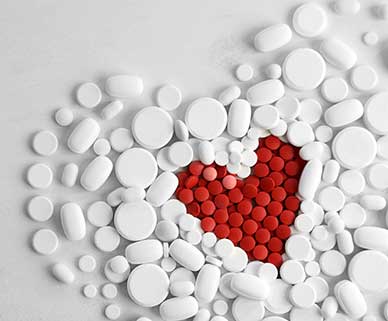Today, the “Standard American Diet” has become, well, standard — especially among men. This diet is based on processed foods that are often lacking in nutrients and vitamins. The result is that many men in the United States are deficient in vitamins. In addition, men have slightly different nutritional needs than women and require more of certain vitamins to produce testosterone, prevent heart disease and otherwise promote good health. Exactly which vitamins are western men lacking? We’ve identified the following top six.
1. Vitamin D
Many modern people do not get enough vitamin D due to widespread sunscreen use. While protecting against skin cancer is important, it is also important to take in enough vitamin D. Not only does this vitamin help you to feel energetic and have good bone strength, it may also be important for the future health of your children. Men need vitamin D to produce the testosterone needed for high fertility and good health. Maternal vitamin intake is not the only kind that matters. Recent studies have found that men who take vitamin D around the time of conception have healthier children with lower rates of obesity.
2. B Vitamins
B vitamins are essential to your metabolism and immune system. They may also be especially important for protecting your cells and tissues from harmful elements in our environment. Air pollution is a health risk in many American cities, contributing to higher rates of cancer and even neurodegenerative diseases such as Alzheimer’s. Researchers have found that B vitamins keep pollutants from doing as much damage in your cells. If you live in a city or town with air pollution, taking enough B vitamins could significantly impact your health.
B12 is especially important for men as they age. Many of the medications taken for heart disease and other common male problems keep the body from absorbing this nutrient. The result is that many men are deficient in this important vitamin.
3. Antioxidants
Antioxidants such as vitamin A, C and E are crucial to preventing tissue breakdown and aging. Our bodies produce free radicals in normal cellular processes, which can accumulate and cause a great deal of damage as we age. Anti-oxidants help to remove these free radicals before they can cause damage. Not only does this slow aging, but it also can help to prevent diseases that are unfortunately common in men such as cancer, heart disease, stroke and dementia.
4. Vitamin K
Vitamin K is well known for being important for bone health and for maintaining good clotting. However, there are other benefits to this vitamin for men. Vitamin D has been found in several research trials to reduce heart disease, which is one of the top killers of men. Because it is found mainly in leafy greens, broccoli and similar foods that are not eaten enough in the Western world, many men may benefit from a supplement.
5. Magnesium
 Magnesium is a mineral that is not just important for maintaining healthy muscles and blood vessels but as an electrolyte that helps our bodies to run more efficiently. Without enough of this mineral, people may suffer muscle spasms, hypertension, headaches and a variety of other health complaints. Unfortunately, the amount of magnesium in our food supply has become depleted in modern times. In addition, modern men are subject to a wide range of conditions that lower magnesium levels such as stress and excessive workouts. If you’re a man and you aren’t taking a supplement or a multivitamin that contains ample amounts of magnesium, you probably aren’t getting enough.
Magnesium is a mineral that is not just important for maintaining healthy muscles and blood vessels but as an electrolyte that helps our bodies to run more efficiently. Without enough of this mineral, people may suffer muscle spasms, hypertension, headaches and a variety of other health complaints. Unfortunately, the amount of magnesium in our food supply has become depleted in modern times. In addition, modern men are subject to a wide range of conditions that lower magnesium levels such as stress and excessive workouts. If you’re a man and you aren’t taking a supplement or a multivitamin that contains ample amounts of magnesium, you probably aren’t getting enough.
6. Omega-3 Fish Oils
Omega-3 fish oils may not technically be a vitamin, but they function as one in the male body. These oils help to lubricate joints, reduce rates of heart disease, promote healthy mood and cognitive function and otherwise improve your whole body health. Because we can only get these oils from certain types of oily fish, the average man simply does not take in enough. Taking an omega-3 supplement will improve your health by ensuring that you always get enough of these oils.
Vitamins for Men Throughout the Lifespan
Getting enough of the right vitamins is not just important in youth, but as we age as well. In fact, older men have very special dietary needs. Vitamin B12 keeps your muscles and other tissues healthy, while vitamin B6 ensures that you have the healthy blood supply you need for high energy and effective healing. Vitamin D and calcium are also important in preventing osteoporosis and bone loss as men age.
How can you make sure that you get enough of these essential vitamins for men? Eating a variety of healthy foods is a start, but it is not enough for many people. Our soils have been depleted of many nutrients, leaving our food without enough of the vitamins we need. Taking a multivitamin is the best answer for many modern men. This is a simple way to ensure that you get all of the vitamins that you need to be healthy over a long lifetime.
 There are several ways that taking in plenty of
There are several ways that taking in plenty of  There are several ways to ensure that you are
There are several ways to ensure that you are  A large part of maintaining good heart health is simply eating a range of vitamins and minerals. B vitamins, folic acid, calcium and
A large part of maintaining good heart health is simply eating a range of vitamins and minerals. B vitamins, folic acid, calcium and  Many people eat yogurt and other probiotic foods for GI tract benefits. However, new research suggests that this delicious food may also be good for the bones. Researchers looked at the bone density of older adults who had different lifestyle factors. Unsurprisingly, exercising, maintaining a healthy BMI and taking plenty of calcium and vitamin D were all linked to higher bone density. However, yogurt consumption was also linked to stronger bones. In fact, elderly people who ate yogurt on a daily or regular basis
Many people eat yogurt and other probiotic foods for GI tract benefits. However, new research suggests that this delicious food may also be good for the bones. Researchers looked at the bone density of older adults who had different lifestyle factors. Unsurprisingly, exercising, maintaining a healthy BMI and taking plenty of calcium and vitamin D were all linked to higher bone density. However, yogurt consumption was also linked to stronger bones. In fact, elderly people who ate yogurt on a daily or regular basis  While there are several medications available to treat elderly people with low bone density, doctors increasingly recommend that people instead work to build healthy and strong bone throughout their lifetimes. This is best done with natural lifestyle changes such as exercise, diet and supplements. Research suggests that the following healthy measures all can contribute to good bone density:
While there are several medications available to treat elderly people with low bone density, doctors increasingly recommend that people instead work to build healthy and strong bone throughout their lifetimes. This is best done with natural lifestyle changes such as exercise, diet and supplements. Research suggests that the following healthy measures all can contribute to good bone density: Although there is significant controversy about the role of saturated fat in heart disease, most doctors and experts agree on several lifestyle changes intended to improve cardiovascular health. Eating a plant-based, whole foods diet is one of the best things you can do for your health, as it cuts back on “bad” fats and additives while ensuring that you get enough vitamins and healthy fats. Taking a walk, as the study authors suggested, also is a lifestyle decision that will improve heart health and mental health at the same time.
Although there is significant controversy about the role of saturated fat in heart disease, most doctors and experts agree on several lifestyle changes intended to improve cardiovascular health. Eating a plant-based, whole foods diet is one of the best things you can do for your health, as it cuts back on “bad” fats and additives while ensuring that you get enough vitamins and healthy fats. Taking a walk, as the study authors suggested, also is a lifestyle decision that will improve heart health and mental health at the same time.  There is currently no known connection between vitamin C deficiency and higher rates of cancer. However, this topic has yet to be studied extensively. It intuitively makes sense that getting enough of a cancer-fighting antioxidant may help to prevent cancer from developing in the first place. Because getting enough vitamin C is
There is currently no known connection between vitamin C deficiency and higher rates of cancer. However, this topic has yet to be studied extensively. It intuitively makes sense that getting enough of a cancer-fighting antioxidant may help to prevent cancer from developing in the first place. Because getting enough vitamin C is